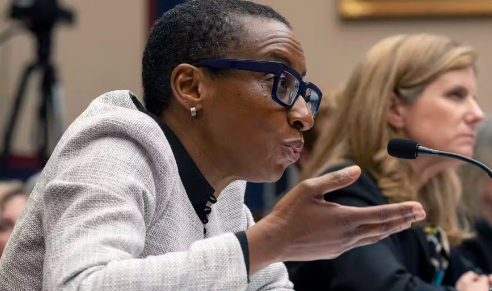former Harvard President Claudine Gay has masterfully played the race card in response to accusations of plagiarism. It appears that in the hallowed halls of academia, being called out for lifting others’ work is now somehow synonymous with bigotry.
Gay, who stepped down from her prestigious position amidst the plagiarism scandal, claims that the allegations against her are not about academic misconduct but are, in fact, thinly veiled acts of racism.
“It’s clear that they are not attacking my ideas but trying to undermine me because of my race,” Gay asserted, managing to flawlessly intertwine the victim narrative with an accusation that would make even the most seasoned spin doctors raise an eyebrow.
Critics argue that this audacious maneuver is a classic case of deflection, attempting to shift the conversation away from the glaring issue of intellectual integrity to the murky waters of identity politics.
“I suppose next we’ll hear that Turnitin, the plagiarism-detection software, is also inherently racist,” quipped one academic wag, shaking their head in disbelief.
The situation has left many wondering if we’ve entered an era where any criticism, regardless of its legitimacy, can be dismissed as an act of prejudice. It seems we’re witnessing a groundbreaking moment where plagiarism accusations are no longer about, well, plagiarism, but are merely a symptom of deeply rooted societal biases.
As the academic world grapples with this unexpected twist, one can’t help but marvel at Gay’s strategic prowess in turning a potential career-ending scandal into a narrative of victimhood. It’s almost as if we’ve entered a realm where accountability is an antiquated notion, and accusations of misconduct can be swatted away with the ease of a mosquito at a summer picnic.
















